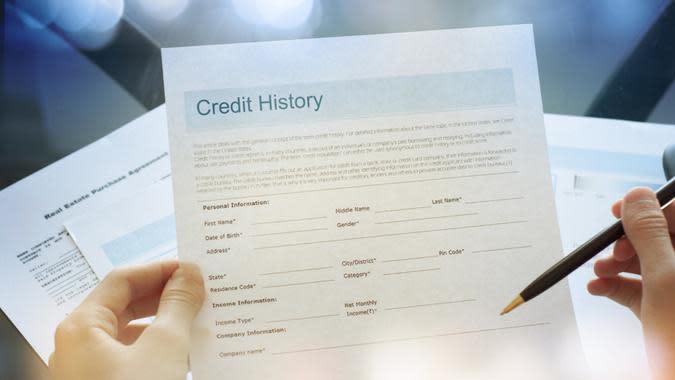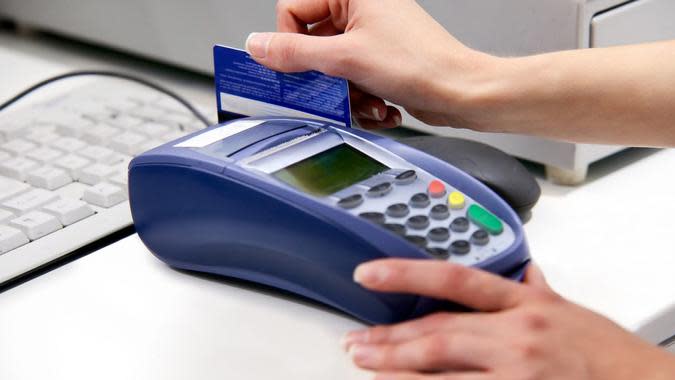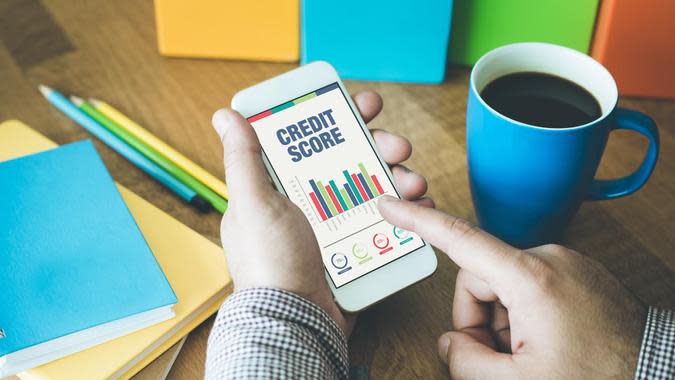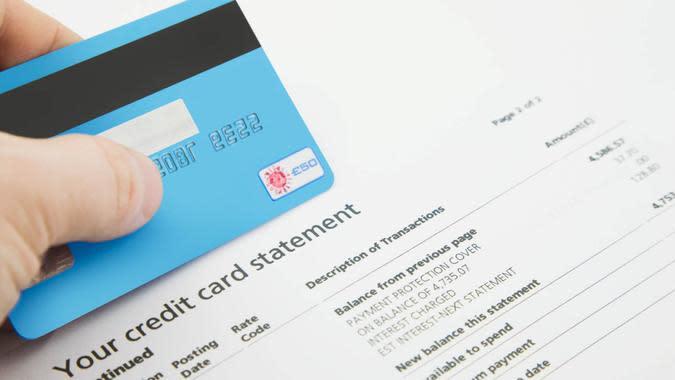How to Start Improving Your Credit Score Right Now

Your credit score has a huge impact on your finances. A higher credit score could mean you'll end up paying less for your home and auto insurance, receive a lower Annual Percentage Rate (APR) for your credit cards and even pay less for your telephone bills.
See: 4 Credit Cards That Are Great for Day-to-Day Errands
Learn: The Top Purchases You Should Always Make With a Credit Card
The coronavirus (COVID-19) pandemic has taken a toll on the credit scores of most people. If you've been thinking of taking action to improve your credit score, now is definitely the time to do it!
Find Out: 90-Second Moves To Raise Your Credit Score 200 Points
See: 10 Things to Do Now If You Have a 500 Credit Score
Last updated: Nov. 1, 2021

A Good Credit Score Doesn't Happen Overnight
Like many good things in life, having a high credit score can take time -- so remember to set realistic expectations. You won't get an instant credit score boost overnight.
The first step to improving your credit score is understanding the numbers your score is made up of. These factors include:
Payment History
Credit Card Utilization
Credit History
Credit Mix
New Credit
Understand: What Is a Good Credit Score?

Check in on Your Payment History
Your payment history is the most important factor since it accounts for 35% of your credit score.
The first thing that lenders will look at is your ability to pay your debt. This will determine the risk that creditors are taking when lending you money.
Making sure that you pay your balance on time is vital to increasing your credit score.
To ensure you always pay on time, link your credit card to your checking account and set up autopay to automatically pay off your credit card balance at the end of the month.
If you're not comfortable or can't pay off your entire balance in one go, set up reminders on your phone throughout the month to remind you of payments.
Set up a pace that you're financially comfortable with while always paying at least the minimum amount due to avoid late charges.
Related: This Easy Trick Will Improve Your Credit Score and Avoid Late Payments

Understand How Credit Utilization Works
Credit utilization makes up 30% of your overall credit score. Aside from your payment history, you should also be aware of your overall credit and how much of it you're using.
Borrowing a lot of money doesn't necessarily mean that you're a bad borrower. There's a fine line, however, between borrowing a lot and overextending your debt. Some banks may interpret it as a high risk.
Here's what lenders look for when assessing risk:
Delinquent accounts
Unpaid accounts
Past bankruptcy
Foreclosures
Recent credit application
Outstanding debt
One way to make sure you're showing lenders that you're a responsible borrower is to use only between 25% to 30% of your overall credit limit.
Looking for an extra credit boost? You should think about requesting a higher credit limit. When your credit limit increases but your balance remains the same, your credit card utilization lowers, increasing your credit score in the long run!
When requesting a higher credit limit, call your bank and/or speak directly to your financial advisor (instead of submitting an online request) and request a higher credit limit through them.
This could increase your chances of avoiding a hard inquiry on your credit score!
Check Out: 10 Credit Score Myths You Need To Stop Believing

Having a Good Credit History Matters
Although your credit history only makes up 10% of your credit score, this factor could be the difference between a good credit score and a great one.
Having a longer credit history has a positive impact on your credit score. Though it doesn't fully reflect your credibility as a borrower, it's generally better to keep your credit accounts open.
Having a higher number of opened accounts will increase the overall amount of credit available for you to use. Lenders will see this as a good indicator as you are only using a fraction of what you're allowed to borrow.
Thinking about canceling old cards you don't use? Consider keeping them open, because they'll improve the length of your credit history. Although this is not the biggest factor that is accounted for in your credit score, it will help you in the long run.
The main exception to this rule is credit cards with an annual fee. Not using those? Cancel them and put your money towards paying off your debts or saving.
See: 30 Things You Do That Can Mess Up Your Credit Score

Be Aware of Your Credit Mix and New Credit
Both credit mix and new credit account for 20% of your credit score (10% each).
Credit mix means two things -- the number of hard inquiries on your account and also the number of accounts opened within a specific time span.
Hard inquiries occur when you apply for a new credit card or a loan. When you submit an application, creditors request to see your credit file to determine your risk as a borrower. Hard inquiries stay in your credit report for up to two years.
Though hard inquiries don't have a huge impact on your credit score, they can lower it. If done strategically, though, opening a new credit card account can boost your credit score!
You should wait for at least 3 to 6 months between applying for credit cards if you want to increase your chances of getting approved and also improve your credit score. A new credit card would increase your total credit available, thus lowering down your credit utilization.
If creditors see that you've opened multiple accounts during a short period of time, it could indicate that you're going through financial difficulties, which will lower your probability of being approved for loans.
Find Out: 25 Ways To Save Yourself From Your Debt Disaster

Build a Healthy Personal Finance Routine
One of the best ways that you can do to change long-term behaviors is to change short-term habits.
"The most effective way of increasing my personal credit score has been having a long history of paying off the balance on my credit card," said Jacqueline Sanchez, a real estate developer and co-owner of Invested Wallet.
For Sanchez, keeping an organized track record of her finances has been a game-changer in her personal finance routine. "For my personal household finances, I use Google spreadsheets. I created custom formulas and have multiple categories to track my household's spending. I followed this practice before starting a small business. However, when I started my small business, I used Quickbooks since I didn't have as many transactions starting," she added.
While you do need a good credit history for a good credit score, try spending the money you already have on your debit card. Use your credit card for points and rewards but make sure you already have the money to pay your debt off at the end of the month!
See: 19 Ways To Tackle Your Budget and Manage Your Debt

Utilize Tools to Keep Track of Your Personal Finances and Credit Score
While checking your credit score too often might negatively impact your score, worry not! Viewing your FICO score often has minimal to no effect on your credit report as it is only a "soft inquiry." A soft inquiry occurs when someone you authorize, such as a job employer or a landlord checks on your credit score.
However, there are a few ways to check in on your credit score without any negative effects.
"I use annualcreditreport.com and a couple of free credit monitoring companies such as Credit Sesame and Credit Karma to keep tabs on my credit reports and VantageScores," said Andrew Latham, personal finance counselor and managing editor of SuperMoney.
Worried that apps like Credit Karma don't fully reflect your credit score? Many banks provide customers with the option to view their FICO scores.
"I track my FICO score through my bank accounts, which offers it for free as a perk," added Latham.
Learn More: 16 Key Signs That You Will Always Be In Debt

Know the Difference Between APR and Interest Rates
One of the benefits of having a higher credit score is that you'll likely receive a lower Annual Percentage Rate (APR) on your credit cards.
Although there is a difference between APR and interest rates on loans, these two terms are basically the same thing when it comes to credit cards. The federal Truth in Lending Act, which governs all consumer lending contracts, requires lenders to state their interest rates as APRs.
APR is the annual cost of borrowing money, which includes interest rates, fees and other charges. Normally, APRs range anywhere between 11.5% to 24.5%, with some companies even offering 0% APR for the first 18 months of opening an account. A higher score may mean that you'll be eligible for a lower APR.
With a higher credit score, lenders would believe that you have made wise financial decisions prior and would be confident that you would pay your debt on time. Because of that, lenders would not need to compensate for the risk by charging you with a higher interest rate.
When opening a new account, pay close attention to the APR. When coming across a situation where you'd need to pay off two credit cards but can only afford to pay for one, choose to pay the credit card with a higher APR since you'll end up paying more in interest rates if you do not pay on time.
More From GOBankingRates
Find Out Who Made GOBankingRates' Best Credit Cards Lists and Get Helpful Tips
When Social Security Runs Out: What the Program Will Look Like in 2035
This article originally appeared on GOBankingRates.com: How to Start Improving Your Credit Score Right Now
